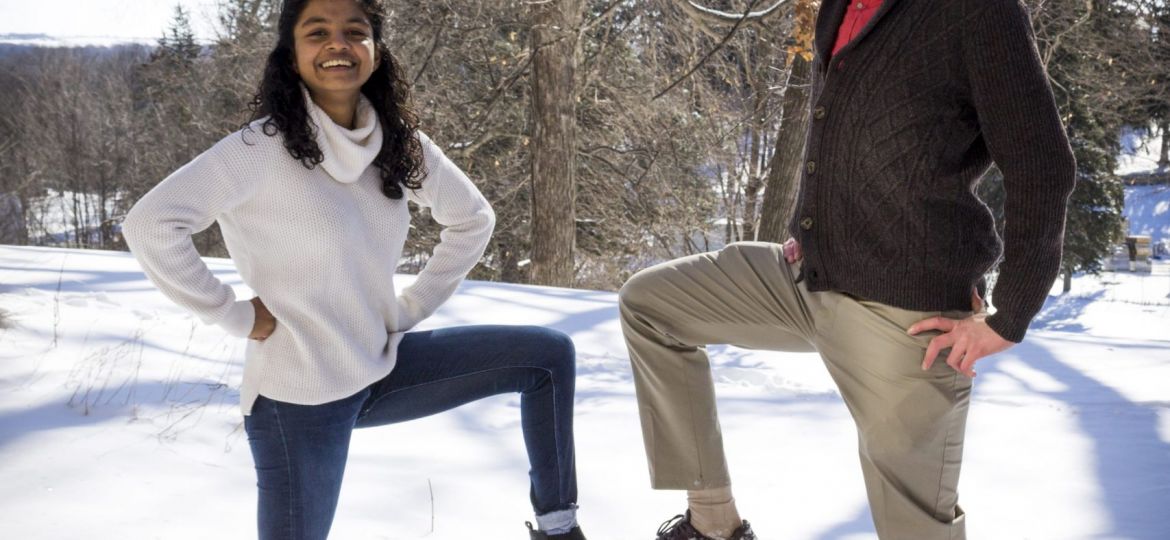
Student Government Association (SGA) President Jauza Khaleel ’18 and Vice President Tim Bergeland ’18 will readily admit they have had a busy few weeks. From over- seeing the fall elections to prepping for the start of Senate, the beginning of the year has been frenetic for the new SGA executive team. When their attention is not captive to the hectic challenges of setting SGA in motion, Khaleel and Bergeland work on refining a reformist vision for this year’s SGA. With aspirations for making SGA more responsive and empowering, Khaleel and Bergeland have big plans in store, though many of the details still need to be fleshed out.
SGA is divided into nine branches, the Senate and a number of other offices. The branches consist of many committees students have heard of, such as the Political Awareness Committee (PAC) that brings
political speakers to campus, the After Dark Committee (ADC) that organizes Pause dances and the Student Activities Com- mittee (SAC) that arranges weekly movies. The various branches are charged with organizing many of the events near and dear to students, carrying out vital responsibilities and funding student organizations. The Pause – and its pizza – is also a branch of SGA.
Each branch of SGA has a branch coordinator, all of whom work closely with Khaleel and Bergeland.
“I think a lot of my work is helping people make their jobs easier,” Khaleel said. “People can always brainstorm with me for events, and brainstorm in terms of financial stuff.” Khaleel and Bergeland also frequently meet with Vice President for Student Life Greg Kneser, Dean of Students Rosalyn Eaton and President David Anderson ’74 to discuss various student issues.
While Khaleel’s job tends to focus on working with the branch coordinators, Bergeland spends much of his time overseeing the Senate and facilitating its discussion. “The Vice President is the person who is chairing the Senate,” Bergeland said. “Basically what I do is facilitate the conversation and prepare the agenda and everything. The Senate is a forum for student issues to be heard and discussed and contextualized within St. Olaf, and turned into proposals to communicate to administrators.”
This fall, Khaleel and Bergeland hope to begin instituting various ideas for improving SGA. First and foremost, they hope to make SGA more accessible by holding office hours in the Cage. Once a week a representative from SGA will be in the Cage to field questions and address student concerns.
More fundamentally, Khaleel and Bergeland hope to make SGA more action-orient- ed and responsive to student needs, particularly when it comes to countering what they view as the regressive policies of the Trump administration.
“Things are changing very rapidly for students here under the Trump administration,” Bergeland said. “With the DACA repeal and … the reworking of a lot of Title IX stuff, a lot of what we have been discussing now is moving forward and how … we best empower students in resisting a lot of these injustices. Then for those who are directly affected, how can we best support them?”
Currently SGA has two official initiatives:
It’s On Us, which seeks to prevent sexual assault, and the Greater Than Campaign, which seeks to create a positive atmosphere surrounding mental health. Khaleel explained how they hope to revamp SGA’s initiatives to be more active and far-reaching.
“[We’re] looking at ways that we can make these initiatives move from beyond information dispensing,” Khaleel said. “How can we think more about ‘how can we make Pause dances a lot safer?’, ‘how can we change the way we talk about mental health?’, talk more about how it’s something that’s embedded in the St. Olaf culture? And even in terms of race, looking at ways that SGA can be more supportive for students of color, and of all different diverse backgrounds.”
Bergeland agreed.
“One of Greater Than’s goals is ‘how can we become more intersectional in the way that we think about mental health?’” Bergeland said.
Khaleel and Bergeland also have a number of plans for improving SGA’s racial sensitivity and supporting the Collective for Change on the Hill. One of these changes is a new implicit bias training required for all SGA Senators, run by a restorative justice group from Minneapolis.
“It’s thinking about how to empower us in pursuit of striving for racial justice, fighting for racial justice, challenging our own implicit biases,” Bergeland said. “I think it’s really important for Senators to hear. How can an anti-racist framework be applied and imbued in all of these different services we’re offering?” They also hope to meet with the Collective, though a meeting has not yet been planned.
While these new executives have an expansive vision for changes to SGA, they have not yet hammered out most of the details. As of now, they have been working with branch coordinators on the fall’s biggest events, including the MEC’s fall concert and PAC’s fall speaker.

